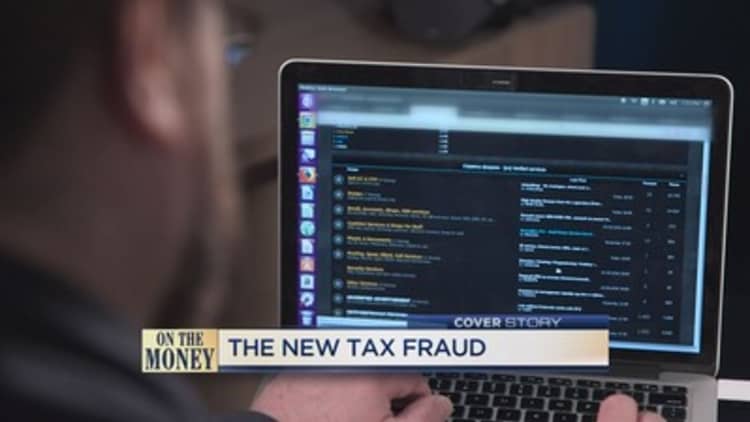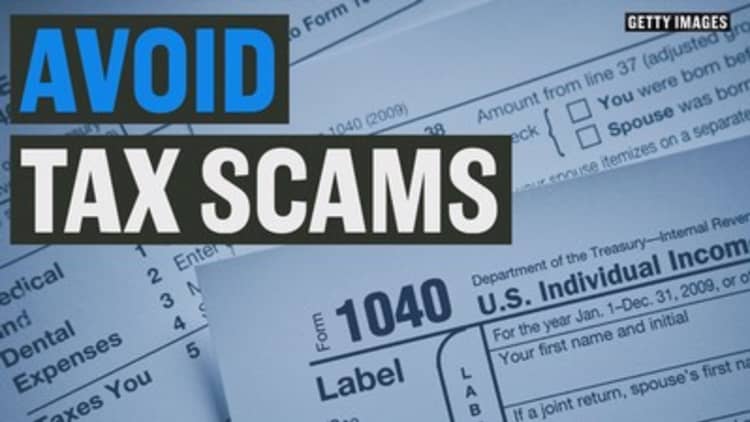Tax scams happen year-round, but they tend to spike during tax season (January 27 to April 15 this year). Of the tax scams reported to the Better Business Bureau's Scam Tracker last year, 61% were uncovered during the first four months of the year.
And younger Americans are more likely to lose money to fraudsters.
About one in three Americans 20 to 29 reported losing money to fraud last year, according to the Federal Trade Commission's 2019 Consumer Sentinel Network data. Meanwhile, only about 13% of those 70 to 79 reported fraud losses. Since 2013, tax scams have cost victims more than $23 million, according to the IRS.
The most commonly reported type of fraud is identity theft. Last year, the FTC received over 650,000 individual reports of identity theft. Many times, this is the type of fraud that follows tax scams.
Here's a look at four of the most common types of scams you're likely to see related to taxes and how to protect yourself from falling victim.
1. Fraudulent tax preparers
While the majority of tax professionals are honest and provide legitimate services, there are some bad apples. The scams that come from these individuals can take several paths. Sometimes an unscrupulous preparer will put together returns using false information in order to boost a refund, while others will attempt to steal personal information included within tax documents.
2. Phishing
Phishing, which includes using fake emails, advertisements or websites to gain personal information, occurs year-round. Typically hackers send what's called a phishing email, in which they mimic a store, company or friend's email and include a link to a false portal asking for your information.
Tax season is the time of year where the data starts getting put up for sale or repackaged specifically with tax fraud in mind, says Emily Wilson, vice president of research at digital risk protection provider Terbium Labs.
"Around this time of year, we do see vendors on the dark web specifically advertising W-2s, that's what they're pitching, that's what they're selling," Wilson says. The intent here is to use the information not only for tax fraud, but also to repurpose it for other types of fraud later on. "No data point is only released or sold once," Wilson says. "These records are repackaged or resold or re-leaked, in some cases."
3. Phone scams
Probably the most ubiquitous tax scam, phone scams occur when criminals impersonating IRS agents call you and threaten you with everything from arrest to deportation if you don't pay a purportedly overdue tax bill. These "remain an ongoing threat to taxpayers," according to the IRS.
Last year, fraudsters "spoofed" the telephone number of the IRS Taxpayer Advocate Service office to make their calls seem more legitimate. The phony calls showed up as the IRS on caller ID. But keep in mind the IRS will never call to demand immediate payment using prepaid debit cards, gift cards or wire transfers. If you do owe money, the IRS will generally mail you a bill first.
4. Tax identity theft
Typically, this happens when a fraudster uses your information to get a refund from the IRS before you even file your taxes. The criminals gain your Social Security number and personal information to file a fraudulent tax return, usually early in the season. Sometimes fraudsters will use a deceased taxpayer's information to try and get a refund.
You could also see a variation of this play out when someone steals your Social Security number and works without paying taxes. Another common form of identity theft during tax season is when someone claims your children as dependents, Lisa Schifferle, an FTC attorney, recently noted in a tax scam webinar.

How to protect yourself from tax fraud
There are dozens of steps you can take to stop yourself from falling victim to tax scams and protect your information. But not everyone has the time (or the patience) to go to extremes. Here are seven easy ways to protect yourself that should eliminate many common threats. And if you do suspect that you've been contacted by a fraudster using an IRS-related scam or fraud, report it to the Treasury Inspector General for Tax Administration at 1-800-366-4484.
1. File early
If you haven't filed your tax returns already, prioritize getting them in as soon as possible. In the future, file as early as possible. The tax filing system, to some extent, is "first come, first served," Wilson says. By filing early, you can beat the criminals to the punch.
"Criminals understand if they can file a tax return that looks legitimate enough, they are going to their payout before the IRS is going to catch a red flag," Wilson says.
2. Keep your Social Security number secure
A lot of identity theft is low-tech, James Lee, chief operating officer of the Identity Theft Resource Center, said during a recent webinar on tax scams. "It all begins with someone having your Social Security number," he says, adding that it can be as simple as losing your wallet or smartphone that has information that a data thief may want.
Leave any documentation with your Social Security number at home and make sure to lock your smartphone, Lee recommends. If possible, avoid loading sensitive data onto your devices.
3. Secure your filing
Keep your tax forms out of the hands of identity thieves. "If you file online, file using a secure connection — don't file your taxes using public Wi-Fi," Schifferle says. If you file by paper, take your taxes directly to the post office and mail it there. That way, no one can steal your tax forms, which have a lot of personal data, from your mailbox. Sadly, there have been cases where thieves stole tax forms directly out of personal mailboxes.
4. Be aware of data breaches
"Data breaches are a significant source of information that people need to execute tax identity theft or start the process," Lee says. Many times, even if the cyber criminals have only a few pieces of information, they can target you using a phishing attack (which can be more than just a phony email) to gain the rest.
When a data breach is announced, make sure you take the proper steps to secure your information, including changing passwords, monitoring your credit reports and using good cyber hygiene.
5. Watch for warning signs
If your Social Security number has ever been lost, stolen or compromised, you're at greater risk of tax identity theft, Schifferle says. If you encounter any of the following, consider it a red flag, report it and avoid giving out any information to the sender:
- You receive letters purportedly from the IRS about a tax return that you did not file
- You can't e-file your tax return because of a duplicate Social Security number
- You get a notification that an online IRS account has been created in your name, or that your existing account was accessed or disabled when you didn't take any action
- You get a notice saying IRS records indicate you received wages from an employer you didn't work for
Keep in mind that the IRS doesn't initiate contact by email, text messages or social media channels to request personal or financial information. If they do need to contact you, it will generally be first by mail.
6. Only work with bona fide preparers
"When you're looking for someone to help you with filing your taxes, make sure that you're dealing with a reputable company and a reputable provider," Lee says.
Qualified tax preparers will have a Tax Preparer Identification Number that you can look up on the IRS website. Additionally, it's always a good idea to check out verified reviews on Yelp and the Better Business Bureau.
7. Freeze your credit
Putting a freeze on your credit reports will stop anyone from taking out a credit card or loan in your name. Plus, it's free to do. "Identity monitoring is too little, too late — it lets you know when an account has been opened with your information," Wilson says. "Freezing your credit will prevent criminals from getting there in the first place."
You should put freezes on any children or minors in your household as well. You'll need to reach out to the three three major credit bureaus, Equifax, Experian and TransUnion, separately and request this freeze. Typically you'll need to verify your identification, as well as provide a copy of the child's birth certificate or Social Security card.
Beyond taking these steps to protect yourself, Wilson says that Americans need to remain vigilant year-round. "When we think about tax fraud season from a dark web perspective, it really starts around the end of previous year," Wilson says, adding that it extends through the April 15th tax deadline.
Don't miss: 9 things new parents need to know before filing their taxes in 2020
Check out: The best credit cards of 2020 could earn you over $1,000 in 5 years



